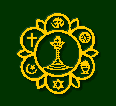
|
 Glossary: here the words are collected that in the
Vahinis at this site are explained by Sai Baba, complemented with
glossaries from Bhagavad Gîtâ and S'rîmad
Bhâgavatam Glossary: here the words are collected that in the
Vahinis at this site are explained by Sai Baba, complemented with
glossaries from Bhagavad Gîtâ and S'rîmad
Bhâgavatam
| A | B | C | D | E | F | G | H | I
| J | K | L | M |
N | O |
P | QR | S |T|U|V| W|XYZ|
D
- Dabari: Tomb (SSS-II)
- Dabholkar - Govinda Raghunatha
Dabholkar: Author of the Sai Sathcharitham, the book about the life of
Shirdi Sai Baba (nickname : Hemadpant) (SSS-II)
- Dadhîci (Dhadheechi): Great
hero, who gave up his bones to Indra to form a thunderbolt for killing
a demon leader (SB-Canto 6 : 10)
- Daivam:
God. (BV-1)
- Daiva-samaana:
Equal to a God (RRV-10b).
- Daivi
Sampath: Divine elevating impulses and motives.
- Daksha: a son of Brahmâ who is a
chief forefather of the population of the universe.
- Dâksâyanî:
a name of Satî.
- Dakshina: Ritual fees (RRV-8).
- Damodara:
The one with a rope around his waist. Refers to
Krishna when he was a young boy.
- Dana:
charity, usually in the form of money (SSS-IV)
- Danda: Stick (RRV-7b), stick carried by sages for performing rites (together with
a kamandalu) (BV-42).
- Dandaka: Great forest which Rama, Sita and
Lakshmana traveled through for ten years of their exile (RRV-10a), (RRV2-1)
- Dandakaranya: The ruler of this region,
Danda by name, violated the chastity of the daughter of his own
preceptor, Bhrgu. Brghu listened to the pathetic story as related by
his daughter and, in the extremity of his anger, he overwhelmed the
region with a downpour of dust. Therefore, this area was sodden deep
with mud, and in course of time, it was a thick jungle from end to end.
The region is named Dandakaranya, after that infamous ruler. (RRV2-1)
- Danava's: The race of evil-minded ogres, (BV-32), sub-human monsters (BV-39) (RRV2-13b)
- Dars(h)an: Seeing and experiencing a saint,
blessing (RRV-7b).
- Dâs'ârha: ['de
dienstbaarheid waardig'] Balarâma [SB,
C10-11]
- Dâsa, Dâsi: (servant) instrument
of the will of God, Krishna.
- Dasara: [read
more about Dasara] The Dasara festival commemorates the victory of the gods
over the demons, of light over darkness, of knowledge over ignorance. (SSS-IV)
- Dasaratha: 'The-ten-chariot hero' name of
the father of Rama, son of Aja and Indumathi (RRV-2), King of Kosala and Rama's eartly father (RRV-10a). Dasa means 'ten' and Ratha means
'Chariot'. Hence Dasaratha (the father of Rama) in fact symbolises
'man' who operates with his ten sense-organs such as the eyes, the
ears, the nose etc. His three wives symbolize man's three Gunas
(attributes) and his four sons, the four Purusharthas (purposes).
Lakshmana also represents the Buddhi (Intellect) of Rama. Hanuman is
the mind, the repository of courage, while Sugriva stands for
Discrimination. With these to help him, Rama succeeds in finding Sita,
the lost Truth. This is the lesson of the Ramayana to everyone - Quote
by Sathya Sai Baba.
- Datta:
Granted (BV-10), (BV-36).
- Dattâtreya: a partial
incarnation of Lord Vishnu who appeared as the son of Atri Muni.
- Dayâ, Tapah, sauca, sathya:
Austerity, cleanliness, compassion and thruthfullness are the legs that
established the age of truth [Sathya Yuga, the 'old days'] [SB;
C1:17-24]
- Dayyam:
The devil. (BV-1)
- Deha-atma
buddhi: The false idea that one is just the body and nothing
more (Geetha Vahini).
- Deham:
Body (SSS-III)
- Dehamatha:
The mother who gave birth to its body (SSS-III)
- Dehi:
The Embodied (BV-42).
- Delhi: [Indraprastha] ('Indra's place', now
Delhi) city where the Pândavas resided and
where Krishna arrived for the
great râjasûya sacrifice that declared Him the
Supreme Personality and from where Duryodhana left angry
being laughed at for his ignorance of falling into water he took for a
solid floor (see: S.B. 10.75).
- Depavali: The Festival of Lights,
commemorating the victory of the uplifting faculties of man over his
down dragging tendencies (SSS-II).
- Des'a-kâla-vibhâgavit: ...
conversant with the differences to place and time ... (SB; 4.8-54)
- Desa-Matha:
The region inhabited by the society it is born into
that stamps on it its way of living, lines of thinking and ideals and
goals (SSS-III)
- Deva: God. (RRV-5) Demi-god; great personality in devotion to Krishna,
selfrealized to administrative independence. "Shining one." A being
living in the higher astral plane, in a subtle, nonphysical body. Deva
is also used in scripture to mean "God or Deity."
- Deva and Asura: Divine and Demoniac (BV-44), Gods and Demons (RRV-11a).
- Devahûti: the mother of the
Lord's incarnation Kapila.
- Devakî: the mother of Lord Krishna. [also
Pris'ni: SB
10:3-32]
- Devakî-nandana:
a name of the Supreme Personality of Godhead, the darling son of
Devakî.
- Devala: an ancient authority on the
Vedas.
- 'Devo
nah priyatâm': 'may God be pleased with us'. (SB 10-34)
- Dhanam:
Riches (BV-1), money (SSS-II).
- Dhara:
Continuous stream of aradh (worship). (SSS-II)
- Dharana: Concentration, fixed attention, one
of eight steps in Patanjali's yoga discipline.
- Dharma: Religious principles; one's eternal,
natural occupation (i.e. devotional service to the Lord) [Sastras] (Bhagavatha Vahini), Righteous conduct,
justice, morality, duty. Karma along the lines of Dharma cannot
be sinful, (BV-4), (RRV-1), Justice, Righteousness, Morality, Virtue, (BV-32), Righteousness (BV-35); one of the Four Goals of
Human Life together with Artha, Kama, Moksha (Welfare, Endeavour and
Liberation), Rightful duties (RRV-5), Dharma Vahini. The regulated life of the
spirit affecting every detail of the process of living, with liberation
from the consequences of ignorance always in view (SSS-II)
Dharma: Austerity, cleanliness, compassion and
thruthfullness [tapah, sauca, dayâ, sathya] are the legs that
established the age of truth [Sathya Yuga, the 'old days'] (SB,
C1-17)
Nârada Bhakti Sutra, verse 62: 'Even after one has
achieved devotional service, one should not abandon one's
responsibilities in this world but should rather continue surrendering
the results of one's work to the Lord. And while still trying to reach
the stage of pure devotion, one must certainly continue executing
prescribed duties.'
- Dharma
dana: the gift of the knowledge of Dharma (SSS-IV)
- Dharmakshethra: See Kurukshetra. 'An arena of righteousness' (SSS-IV)
- Dharma
Sikshana: Learning Dharma (Dharma Vahini).
- Dharma
Marga: the principles of right social behavior (SSS-III)
- Dharma
Narayana: The personification of Dharma (Dharma-Vahini).
- Dharmaraja: Another name for
Yudhishthhira, the eldest Pândava, meaning: king of righteousness
or the righteous. (BV-4)
- Dharma-rakshana:
The Guardianship of Righteousness (RRV-6).
- Dharma-sthapana: Restoration or
revival of dharma, justice (SSS-II), the revival and re-establishment of the
moral order in human affairs (SSS-III)
- Dharma
vijaya: the triumph of righteousness (SSS-IV)
- Dharmavratha:
A strict adherent of the vow to be righteous in word, thought and deed (RRV-10b).
- Dharma
yatras: pilgrimages (SSS-IV)
- Dharmo
rakshathi rakshithah: Dharma saves those who save it (RRV-6b) Satya annasti paradharmah: there is no Dharma
higher than Truth (SSS-III)
- Dhenuvratha:
Ritualistic vow of 'Cow Worship'. (RRV-2)
- Dhotî and kurtâ: Long
piece of cloth worn around the waist and long shirt. Standard clothing
worn by the male temple-devotees.
- Dhritarâshthra: the uncle of the Pândavas
whose attempt to usurp their kingdom for the sake of his own sons
resulted in the Kurukshetra war.
- Dhruva (Maharaja): Grandson of Brahmâ and
son of Uttânapâda; as a child, at the age of five, he
performed severe penance and attained self-renunciation (SSS-III).
- Dhuni: Fire-place (SSS-II)
- Dhyana(m): (Bhagavatha Vahini) Meditation, equanimity (BV-1), (BV-44).
- Dig
vijaya: conquest of territory (SSS-IV)
- "Dikku
lenivanikki Devude Gathi": For him who has no refuge, God is the
refuge (SSS-II)
- Dilipa:
King [RRV-2, RRV-7a, RRV-7c]
- Diti:
the wife of Kasyapa Muni and mother of the demons Hiranyâksha and
Hiranyakas'ipu.
- Divya:
Divine.
- Divyatma:
The Universal Absolute Entity (RRV2-12b)
- "Divyatma
Swarupulara": "Ye, Divine Atmic Realities" (SSS-II)
- Dronâcârya:
the military teacher of the Pândavas who was obliged to fight
paganist them in the Battle of Kuruksetra.
- Drsya:
It is 'absolute non-dualist' philosophy when the seen (Drsya) world is
superimposed on the undivided, indivisible Brahman. (SSS-III)
- Durgâ: the personified material energy and
wife of Lord Shiva. Also Mâyâdevî (SB 10:2-11,12)
- Durvâsâ
Muni: a powerful mystic yogi, famous for his fearful curses.
- Duryodhana: Kaurava, nephew of Arjuna, who
lead the hostile armies together with his other hundred brothers, the
sons of the blind oncle Dhritarâshthra.
- Dushana: Demon chieftain, brother of Khara and Surpanakha (RRV2-2).
- Dushashana: Duryodhana's eldest brother
and one of his inner circle of close advisors. He grievously offended
Draupadî and the Pândavas, and as a result Bhîma
vowed to kill him and drink his blood. He did so during the Kurukshetra
war.
- Dvaipâyana - Vyâsadeva:
the original compiler of the Vedas and Purânas and author of the
Vedânta-sûtra and Mahâbhârata.
- Dvârakâdhîsa:
a name of the Supreme Personality of Godhead, the Lord of the city
Dvârakâ.
- Dvîpa: 'separate area, island or
continent'. There are seven dvîpa's. Also Brahmâ's lotus,
the galaxy, is described as a dvîpa. The Eurasian continent is
known as Jambhûdvîpa. (see also varsha and S.B. Canto 5 chapter 2, S.B. Canto 5 chapter 16)
- Dwapara Age (Yuga): The Yuga in which
Krishna was on earth (BV-36).
- Dvârakâ: Was applied to the city
built by Krishna on an island, because, the word means, a place the
doors of which are open for the four castes and for the four types of
men namely Aartha, Artharthi, Jijnasu and Jnani, so that they may
attain the four Purusharthas. (SSS-II) Dvârakâ: (many-gates; for all
walks of life) The city within the sea to which Krishna together with
His loyals retreated after His stay in Mathûra, the capital of
His region of birth (see 10: 50).
- The city where Lord Krishna's pastimes as a head of state, wellfaring
noble, father and lover took place.
- Dwehsa
klesha: hatred.
|
|



